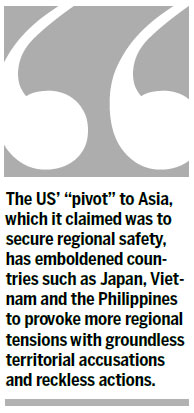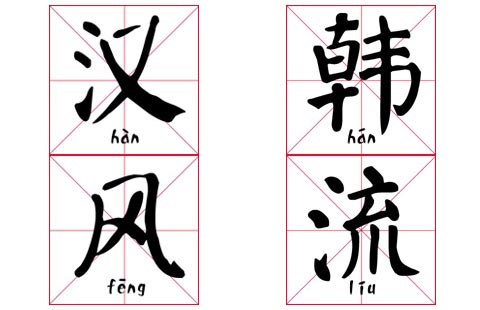
Thawing a budding Cold War
Updated: 2014-07-04 08:40
By Jin Qiangyi (China Daily)
Comments Print Mail Large Medium SmallPresident Xi Jinping's visit to Seoul is a significant and proactive effort to restabilize trust in Northeast Asia
Chinese President Xi Jinping began his first state visit to the Republic of Korea on Thursday. His visit has drawn worldwide attention due to its strategic significance in readjusting the political structure in the Northeast Asian area. In other words, a warmer relationship between China and the ROK will prevent a new Cold War from emerging in Northeast Asia and serve as a major boost to regional stability.
However, his visit to Seoul should not be misinterpreted as an about-face in China's policy toward the Democratic People's Republic of Korea. And the visit will not damage ties with the DPRK.
China remains opposed the DPRK's pursuit of nuclear weapons, which severely harms China's national interests. In fact, Beijing expects Pyongyang to focus on economic development rather than seek nuclear weapons. Only by doing so will there be a chance of rapprochement on the Korean Peninsula. However, Beijing continues to insist that the DPRK's security concerns need to be considered if it is to be encouraged back on a sound track.
In recent years, East Asia has witnessed constant political unrest triggered by the rebalancing of the United States to Asia, the disputes between China and Japan and the ROK and Japan over territorial sovereignty and Japan's attempts to whitewash the atrocities it committed during World War II, the Abe administration's sinister craving for military power, and the DPRK's nuclear program. These suggest a worrying trend toward a Cold War developing in the region.
The US has used the growing tension on the Korean Peninsula over the past five years as an excuse to return to the Asia-Pacific. The DPRK's ill-considered underground nuclear test in 2009 started a longstanding confrontation on the Peninsula. The sinking of the ROK corvette Cheonan and the exchange of artillery fire between the DPRK and the ROK military on Yeonpyeong Island in 2010, served as the excuse for the US to interfere in Asia again. The US' "pivot" to Asia, which it claimed was to secure regional safety, has emboldened countries such as Japan, Vietnam and the Philippines to provoke more regional tensions with groundless territorial accusations and reckless actions.
Given the ROK's special role in the current international political structure, Xi's visit is strategically correct and can prevent China from becoming inextricably embroiled in the intractable Korean conflict. More importantly, it can restabilize the shaky trust between countries in Asia-Pacific area.
From Beijing's perspective, sticking to its previous Korean Peninsula policy, which prioritized the traditional friendship with Pyongyang, will only place it in a strategic dilemma if the DPRK continues to threaten the Japan-US and ROK-US military alliances with nuclear weapons.

Meanwhile, Seoul, which is playing a bigger strategic role in the Asia-Pacific due to its "awkward" position, craves political and economic support from both the US and China to advance the reunification of Korea. China is now the largest trade partner of the ROK; nearly one-fourth of its products are exported to China per year. If Seoul chooses to be at the command of Washington in diplomacy, a new Cold War is very likely to be triggered by a one-sided game in which the US hegemony enjoys overwhelming superiority. However, if it develops multilateral relations with both Beijing and Washington, East Asia will be in a more stable state. Hence Xi's visit to Seoul is inspiring because it shows Beijing's proactive effort to preserve regional peace in East Asia.
Of course, a warmer relationship between Beijing and Seoul is unlikely to please Japan and the US. What Japan fears most is Beijing and Seoul joining hands to oppose the worrying rightist trend in Japan. China and the ROK have both taken a firm stance against Japan's attempts to rewrite wartime history. The US is concerned that tighter Beijing-Seoul ties might weaken its alliance with the ROK, and lead to the failure of its efforts to contain China.
However, what Washington should be really upset about is the Abe administration's vicious ambition to regain military power. Abe's desire to relive Japan's past militarist dream has been made crystal clear with his recent provocative actions, such as the dangerous encounter when two Japanese warplanes tailed a Chinese military aircraft over the East China Sea last month, and Abe's reinterpretation of the pacifist Constitution to enable Japan to exercise the right to collective self-defense.
The US government is obliged to restrain Japanese rightist forces from going too far on the path towards new militarism, not only to secure its own interests in Asia, but also the world's pursuit of justice and peace. Additionally, a better Beijing-Seoul bond can strategically benefit relations between China and the US as well, which will further boost stability and all-round cooperation in Asia-Pacific. The author is a professor of Korean Studies at Yanbian University in Jilin province.
(China Daily?07/04/2014 page8)



